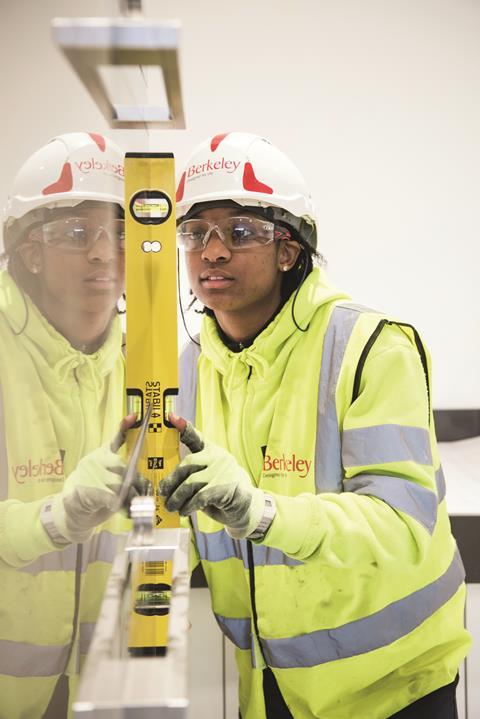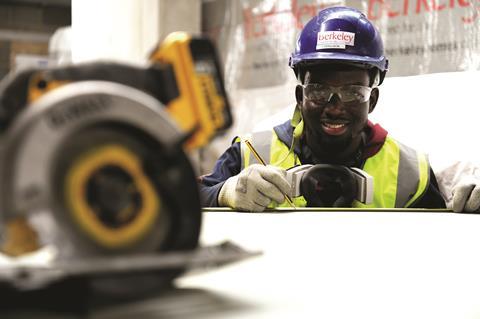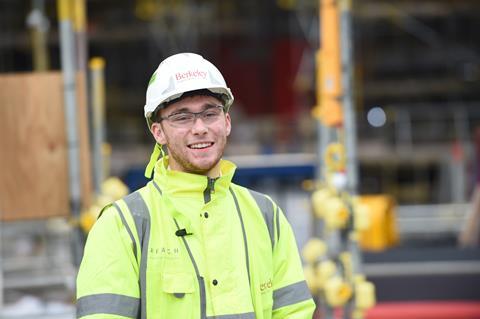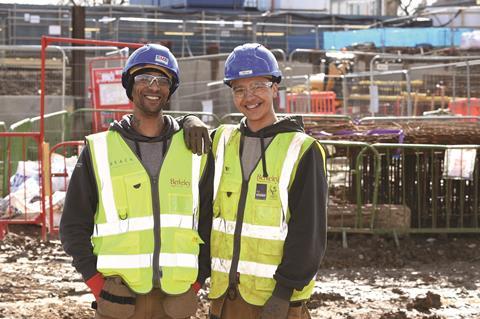While a great deal of focus is placed on encouraging people to become apprentices, less stress is put on actually retaining them once they join schemes. We hear from Berkeley Homes and its apprentices to find out how to hold on to the next generation
With the construction sector facing a skills shortage, organisations are on a mission to encourage more young people to choose the industry as a career. Graduate schemes and apprenticeships are largely seen as the main entry points, and with an ambitious target for new apprentices by 2020 set by government ã three million ã firms are required to not only ensure schemes are an attractive proposition for prospective employees, but also ensure that progress throughout the course of the apprenticeship is sustained enough to retain them in the long-term. Here, Stav Aristokle Hill of Berkeley Homes outlines her companyãs efforts to help its learners go the distance.

This yearãs National Apprenticeship Week triggered a flurry of commentary and debate on everything from the government levy to the target of 3 million apprenticeships by 2020. But there was one issue that was notable in its absence ã retention.
With a marked slump in the number of people taking apprenticeships, itãs no surprise that the focus has been on getting new starters through the door. But the reality is that once people start an apprenticeship scheme, they are not always staying. Government figures indicate that one in three apprentices failed to complete their apprenticeship programme in 2015-16.
The question of why is a complex one, and the quality of schemes is undoubtedly a concern, with an ongoing inquiry by the Education Committee. But thereãs also an issue with the level of support and mentoring on offer.
With the focus on gaining qualifications, weãre losing sight of the apprentices going through the system and the challenges they face ã from financial pressures at home to discrepancies between what they expected from their apprenticeship and what they are actually receiving. Monitoring and tackling these challenges as they occur can make the difference between an apprentice sticking at it or throwing in the towel.
Of course, thereãs no silver bullet, but when it comes to support and mentoring there is much more that could be done. As a sector, we can start with changing the way we structure and approach apprenticeships.
Our Reach Apprenticeship Programme was established in 2016. Like many, itãs a structured apprenticeship scheme created to tackle the industryãs skills gap and provide meaningful employment opportunities to people in the London boroughs in which we work. On this scheme, apprentices also benefit from a programme of support from business champions and mentors, with a focus on building team spirit and boosting self-esteem and confidence.
Continued communication and dialogue is key. Because our apprentices are spread across a variety of sites, each site has a dedicated mentor who acts as a crucial point of contact. A specialist Reach team also meets every month with the mentor, the subcontractor, the apprentice and the college to review progress. This is an invaluable opportunity to discuss any personal or professional challenges an apprentice is facing and implement changes. Only the other month, for example, we had a situation where an apprentice was struggling with financial pressures at home and worrying about travel and food costs at work. Simply by offering lunch vouchers and a travelcard, we were able to alleviate these worries and encourage the apprentice in question to stick with it.
There are also aspects of the scheme that are aimed at building team spirit and developing self-confidence and esteem, such as an ãOutward Bound Trustã trip. This week-long course is available to all Reach apprentices, and explores areas such as confidence, leadership, negotiation and stress.
Putting the emphasis on meaningful careers, rather than just ãjobsã, is critical. Thereãs no doubt that a direct line of sight into employment or further progression makes a huge difference to an apprenticeãs determination to continue. Weãve therefore ensured there is a range of career development options available to apprentices completing our programme ã from joining the supply chain as either a next generation tradesperson or advanced apprentice, to working towards a supervisory or management position.
Government targets to increase the number of apprentices coming into our industry are admirable but they will be in vain unless we ensure these apprentices are met with a supportive, inclusive environment geared towards long-term careers and learning. To ignore the potential challenges ahead would be to rob our sector of a generation of potential talent.
Stav Aristokle Hill is Reach apprenticeship programme manager at Berkeley Homes

RainûÀ Malcolm
RainûÀ had secured a place at university to study architecture but decided that route was not for her. She is now in her second year of a Kitchen Fitting Apprenticeship with Berkeley Homes.
Why did you choose to do a Berkeley Reach Apprenticeship?
I was interested in architecture and the design aspect of construction but was worried about the cost of a degree. This apprenticeship scheme was more geared towards employment and offered the chance to learn and earn at the same time.
How have you benefited from the support on offer during your apprenticeship?
Our mentors work with us on site, so they get to see how weãre doing on a daily basis. They also help to tailor our apprenticeships to our specific interests, which has kept me really motivated. Chatting to people at college, it seems like this sort of level of support is unique. Some of my friends on other schemes are struggling to make sure they have the right evidence to complete, whereas my mentor is really hands-on in making sure what Iãve got is compliant.
Iãve also really liked the focus on developing broader skills. I got to go on an ãOutward Boundã trip and try out some management challenges, which was great. Iãd never considered a management role before, but now Iãm hoping to progress onto Level 3 Management after completing my apprenticeship.
What challenges do apprentices face?
Thereãs still a stigma attached to apprenticeships. My school really pushed me towards university, and apprenticeships were seen as a second-class option. For the younger apprentices, working on site can be quite a scary thought. Some of my friends at college have found their apprenticeships really disappointing because theyãve been given jobs that arenãt related to their courses. Iãm lucky ã our mentors speak directly to the people we work with to ensure weãre given appropriate roles and constantly check that weãre enjoying our courses.
Are there any particular challenges you have faced during your apprenticeship that having a mentor and ongoing support has helped you to overcome?
Being a woman on site, I was apprehensive about othersã perceptions of me. I always had confidence in my ability to get tasks done, but it was good to know that there was support available if I needed it. Working on site can be quite intense, with lots of different trades all working together, so itãs good to know that I can speak to my mentor about any issues I might have.
How has your apprenticeship helped your future job prospects?
Iãve got hands-on experience in the industry now, which I wouldnãt have been able to get from a university course. There are certain things you canãt learn from textbooks, such as on-site safety and working with other trades. Itãs also a great opportunity to network with other people in the industry and learn about the different roles available in construction.
What are you hoping to do after completing your apprenticeship?
Iãm hoping to stay with Berkeley and progress onto the Level 3 Management course.

Tajae Ferguson
After college, Tajae self-funded an electrician training course but when it came to finding a job he didnãt have the practical experience needed and no one would hire him. He took the bold step of changing direction and now, age 26, he is in his second year of a Carpentry Apprenticeship with Berkeley.
Why did you choose to do a Berkeley Reach Apprenticeship?
I wanted to learn a trade so that I could go straight into a job, and I thought that working for one of the UKãs biggest developers would help me in my career. Berkeley also provides our tools, which was a real bonus for me.
How have you benefited from the support on offer during your apprenticeship?
I have weekly and monthly meetings with my mentor to ensure Iãm on track to complete. He helps make sure the course goes at my own pace, and as a result of completing various modules quicker than expected, I should get to finish my apprenticeship earlier than planned.
What challenges do apprentices face?
For me, it was really important that I felt like I was being challenged enough. I know that apprentices in other companies just end up making the tea, which I think is one of the reasons why the drop-out rate is so high. On the Reach scheme, our mentors help to ensure our courses are carefully structured and check weãre happy with the roles and responsibilities weãre given.
For younger apprentices, self-confidence can also be a real issue. Itãs great that this apprenticeship scheme tackles that head on ã on the Outward Bound trip people discovered skills and self-belief they didnãt know they had.
Are there any particular challenges you have faced during your apprenticeship that having a mentor and ongoing support has helped you to overcome?
There was a point near the beginning of my apprenticeship when I felt like I was losing motivation. My mentor helped work out a plan and I was teamed up with a subcontractor called Ruairi. Heãs shown me loads of tricks of the trade, and has really inspired me to stay committed. My mentor could see how well I worked with him and has helped me gain as much on-site, practical experience with him as possible.
How has your apprenticeship helped your future job prospects?
I have hands-on experience in the trade and have met lots of industry contacts. Iãve had three job offers through the subcontractors Iãve worked with ã Iãm definitely very employable now.
What are you hoping to do after completing your apprenticeship?
Iãve accepted the job with the most learning potential.

Pearce Tomlinson
Pearce began a Reach Logistics Apprenticeship straight from college, aged 18. Since starting the scheme, Pearce has seen a major change in his self-confidence and communication skills.
Why did you choose to do a Berkeley Reach Apprenticeship?
I was considering what to do after college and knew university wasnãt for me. I didnãt want to learn in a classroom and thought that learning on the job and getting paid was the ideal situation.
How have you benefited from the support on offer during your apprenticeship?
If I ever have a problem I know I can talk to my mentor ã and whatãs really nice is that theyãll listen to ã and help with ã problems out of work too. That makes a big difference because whatãs going on at home can affect how you do at work.
What challenges do apprentices face?
Starting something completely new was a challenge for me. Iãd never stepped foot on a construction site before, but the people around me were great. Having that support is really important ã you can see how otherwise apprentices might just feel overwhelmed.
Are there any particular challenges you have faced during your apprenticeship that having a mentor and ongoing support has helped you to overcome?
Iãm one of the younger apprentices, which was a bit intimidating at first, and I was worried that I didnãt know much about the industry compared to the others. My mentor really worked with me on this and Iãve noticed how my communication skills and self-confidence have developed. I wasnãt shy when I started this course, but I wasnãt particularly confident either, and now I know I can work with all sorts of people in different situations.
How has your apprenticeship helped your future job prospects?
It has given me the chance to learn on the job, which sets me apart from my friends who are at university. Iãm still learning new things every day, and not just about logistics ã working with other teams on site has really broadened my industry knowledge.
What are you hoping to do after completing your apprenticeship?
Iãm hopeful that there will be a job for me here at the end of my apprenticeship. Itãs important to me that I end up doing something I enjoy, so my apprenticeship has been a great way to learn a trade while making sure itãs the right career for me. Everything is going well and Iãm excited for the future.

Dalton and Tyreke Borg
Father and son Dalton and Tyreke Borg are both current apprentices with Berkeley. Dalton previously worked for Islington Council and is in the second year of his Brick Laying Apprenticeship. Tyreke is in the first year of a Steel Fixing Apprenticeship and, at age 16, is one of this yearãs youngest Reach Apprentices.
Why did you choose to do a Berkeley Reach Apprenticeship?
Dalton: I worked for Islington Council for 14 years but found myself out of work. I found out about the scheme when I was considering my next steps and thought it sounded like a good career move.
Tyreke: My Dad recommended the apprenticeship scheme to me. I wanted to do something that would challenge me in the long run and thought steel fixing seemed interesting, so I went for it.
How have you benefited from the support on offer during your apprenticeship?
Dalton: The support and mentoring at Berkeley is great ã itãs one of the main reasons I encouraged Tyreke to join. Berkeley pays for our tools and travel expenses, so what we take home in wages is actually ãoursã. Other people I know on apprenticeships donãt have this sort of financial support ã weãre definitely treated differently here.
Tyreke: The mentors have been a huge help. I think theyãve had a big impact on all of us ã we can be ourselves with them and theyãre always there to listen to any problems we have. Theyãve helped us get to know each other as well. Iãve just got back from an Outward Bound trip with other apprentices and mentors, which has really brought everyone together. Now I know if Iãm ever moved to another site I donãt have to worry about being by myself, there will be other apprentices who Iãll know.
What challenges do apprentices face?
Dalton: Some of the contractors can be hard to work with as they donãt want to give apprentices much responsibility. The support system at Berkeley helps to ensure we get the experience we need to complete our apprenticeships, and our mentors make sure weãre comfortable with the jobs weãre being given. Weãre treated like a member of the team right from the beginning.
Tyreke: Being the youngest person here and coming into the industry without any experience was a bit intimidating initially. I was 15 when I did my interview ã it was the first time Iãd ever worn a suit and I had no clue about construction. Now Iãve learned that my age doesnãt have to hold me back, and I can achieve anything if I put my mind to it.
Are there any particular challenges you have faced during your apprenticeship that having a mentor and ongoing support has helped you to overcome?
Dalton: Iãve felt really supported all the way through. Our mentors help us with everything ã whether itãs work or home related. For me, help with my fuel costs to and from work has been a real help.
Tyreke: On site you can sometimes get pulled into doing work that isnãt relevant to the course. The mentors are always on the other end of a phone to stop that happening and to make sure Iãm gaining the experience I should be. Theyãve kept me moving forward.
How do you think your apprenticeship has helped your future job prospects?
Dalton: Itãs opened my eyes to the different types of jobs available in construction. Once Iãm qualified, I could work anywhere ã abroad or privately. I didnãt realise construction had so many opportunities until I started here.
Tyreke: Working for Berkeley will open doors for me. Working on site has helped me make my first contacts in construction ã hopefully the people Iãve worked with will remember and trust me and that might lead to work in the future.
What are you hoping to do after completing your apprenticeship?
Tyreke: In the long term Iãd love to be able to start my own business.


























No comments yet